Key takeaways:
- State laws regarding cannabis often contrast with federal laws, leading to confusion and anxiety among consumers, particularly regarding cannabis edibles.
- Cannabis edibles provide a discreet and manageable way to consume cannabis, making them appealing for new users and those seeking a consistent experience.
- Regulations for cannabis edibles differ significantly across states, affecting safety, market confidence, and the challenges businesses face in navigating federal restrictions.
- The classification of cannabis as a Schedule I substance under federal law limits access to banking and financing for cannabis businesses, hindering innovation and creativity in branding and marketing.
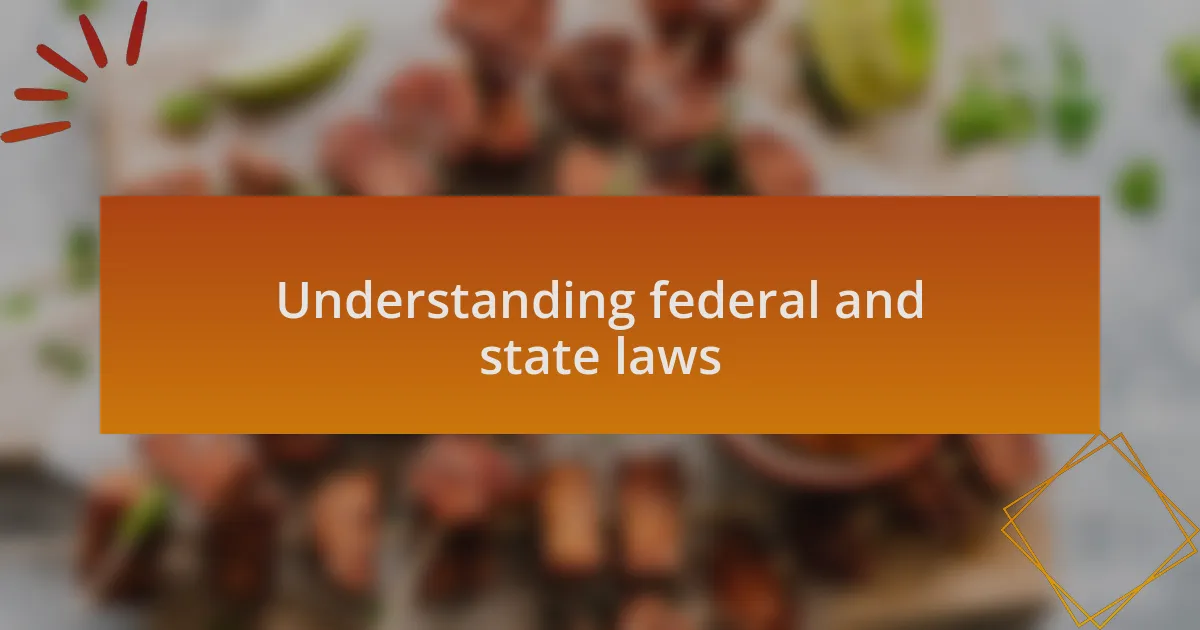
Understanding federal and state laws
Navigating the landscape of federal and state laws can feel like stepping into a maze. I remember feeling overwhelmed when I first tried to understand why cannabis is legal in some states but still classified as a Schedule I substance federally. It’s a perplexing situation that makes you wonder: how can two governing bodies have such differing views on the same issue?
In my experience, state laws often reflect the evolving attitudes of the local population toward cannabis, while federal laws tend to lag behind, creating a complicated legal framework to maneuver through. For example, just last year, I attended a seminar where a legal expert explained how a state like California can legalize cannabis for both medical and recreational use, yet individuals can still face federal penalties for possession. It’s those contradictory laws that sometimes leave consumers feeling anxious about their choices.
It’s crucial to appreciate that while state laws can create an environment for cannabis use, they don’t negate the federal laws entirely. This reality leads me to reflect on consumer behavior—how does this dichotomy affect how people approach cannabis edibles? I often find myself wondering if the fear of federal repercussions limits access or safely steers users toward compliant products. Understanding these legal nuances is essential for anyone looking to explore the world of cannabis edibles responsibly.
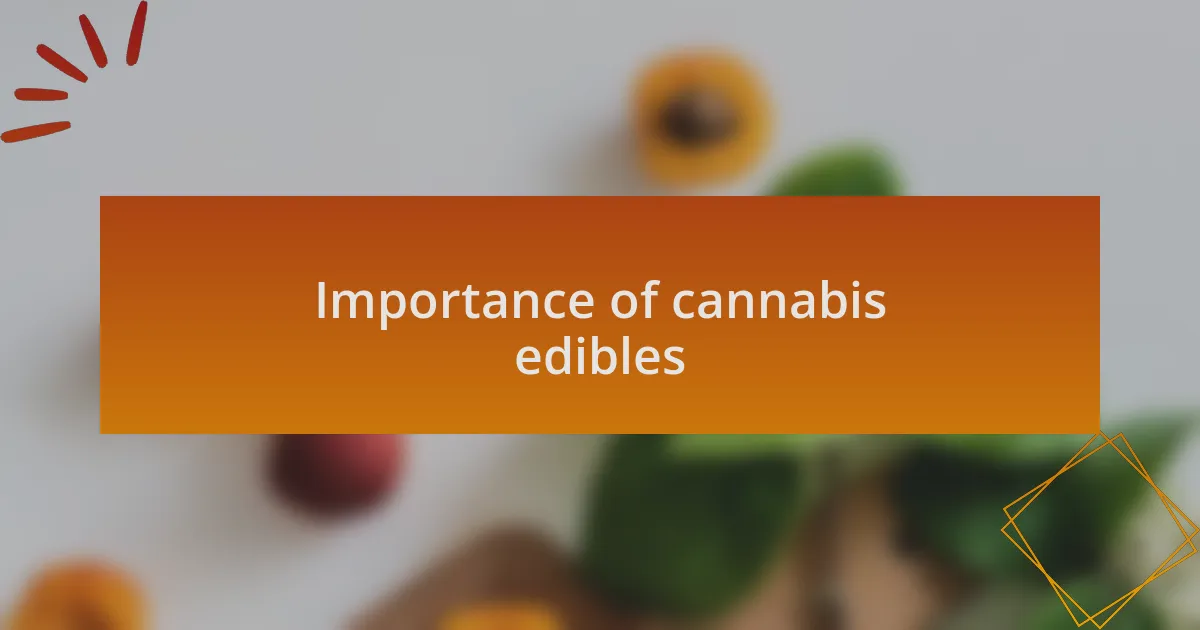
Importance of cannabis edibles
Cannabis edibles hold significant importance in the overall cannabis experience, particularly for those who prefer a discreet and palatable method of consumption. I distinctly recall my first encounter with a cannabis-infused brownie—it was an eye-opener. The way it allowed me to unwind without the more intense effects sometimes associated with smoking was a revelation. Have you ever had a similar experience where a simple treat transformed your perception?
The versatility of cannabis edibles also can’t be understated. With a myriad of options available—from gummies to baked goods—there’s something suitable for everyone. Personally, I’ve found that edibles can provide consistent dosing, making it easier to manage my intake. This method opens the door to a more predictable and enjoyable experience compared to other consumption methods that can be harder to gauge.
Moreover, edibles serve as a bridge for newcomers to the cannabis world, especially those who might be hesitant about traditional forms of consumption. I remember when a friend of mine, initially apprehensive about cannabis, finally decided to try a low-dose edible at my suggestion. The transformation in her outlook was incredible; she felt relaxed without the anxiety that sometimes comes with smoking. It’s a powerful reminder that cannabis edibles can play an essential role in reshaping perceptions and expanding accessibility for users at all levels.
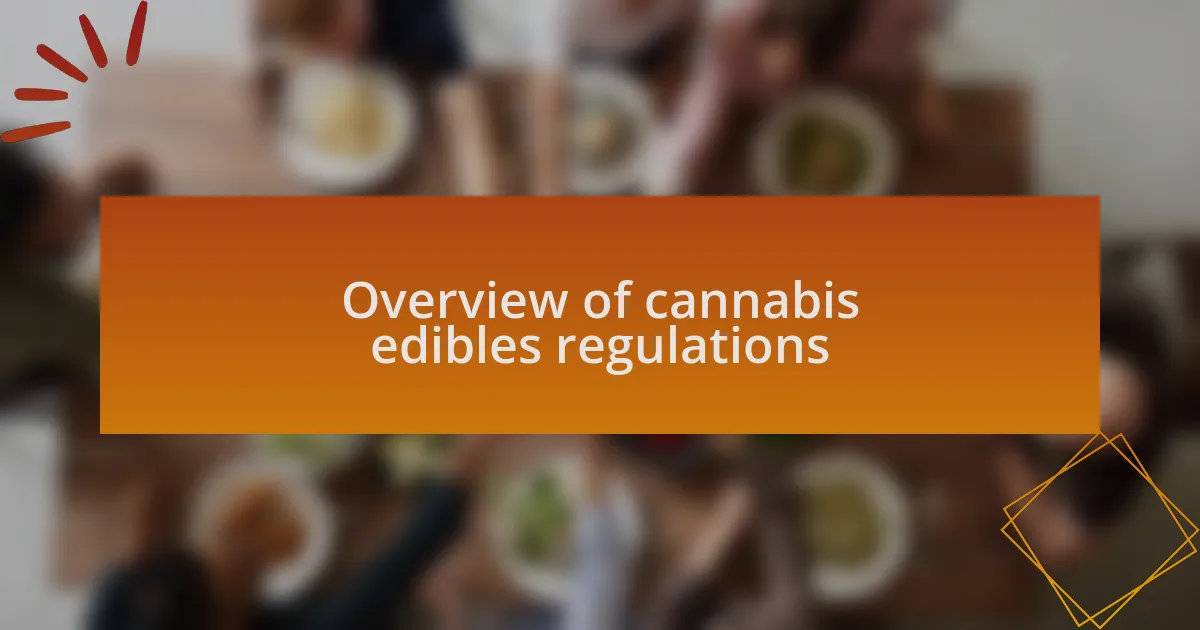
Overview of cannabis edibles regulations
Regulations surrounding cannabis edibles vary greatly between federal and state laws, which creates a complex landscape for both consumers and producers. I remember feeling overwhelmed when I first learned about the patchwork of rules; for instance, while some states have enacted comprehensive regulations allowing the sale of edibles, others maintain strict prohibitions. Why is that? It’s largely due to differing attitudes toward cannabis, which hinders the establishment of a cohesive federal framework.
In states where edibles are legal, regulations often specify everything from permissible ingredients to packaging requirements. I was pleasantly surprised to find that in my state, there are even limits on THC content per serving, ensuring a safer experience for users who may not be familiar with how to gauge their tolerance. Have you ever thought about how such regulations not only promote safety but also foster a responsible market? That was a pivotal realization for me; it highlighted how regulations can enhance consumer confidence.
On the other hand, the federal stance remains largely prohibitive, complicating matters for businesses that operate across state lines. I recall reading about a manufacturer who had to navigate these murky waters, constantly worried about potential federal repercussions despite being compliant with state laws. It raises the question: how can we ensure that consumers are protected while allowing for innovation in a rapidly evolving industry? This tension between state rights and federal limitations continues to shape the future of cannabis edibles and their regulation.
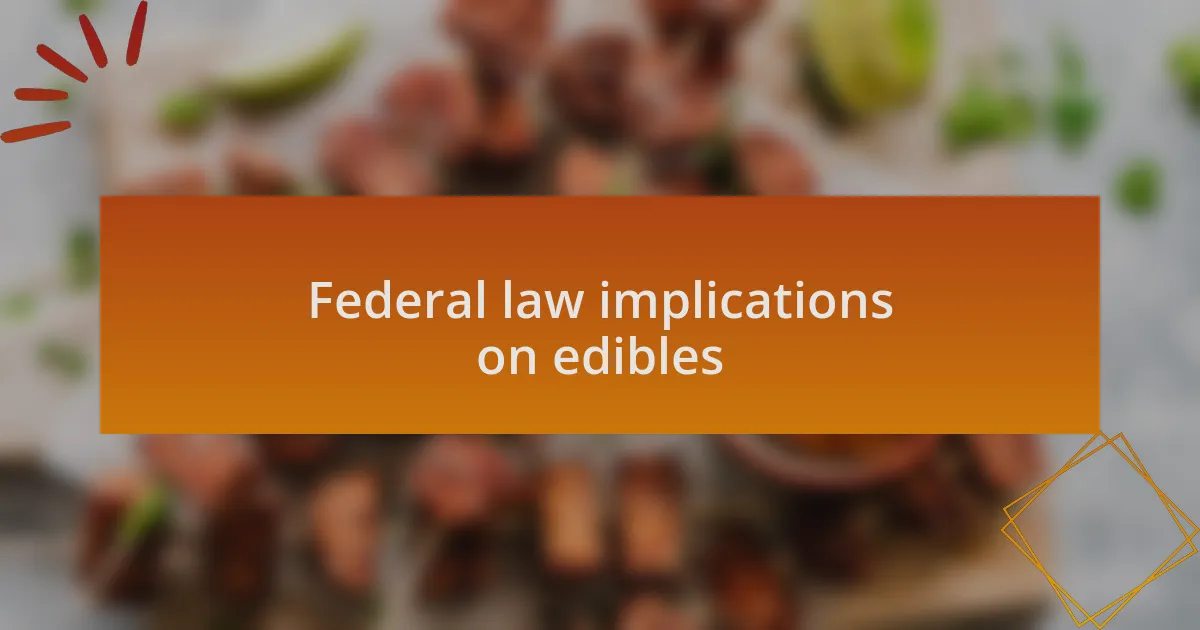
Federal law implications on edibles
Federal law continues to classify cannabis as a Schedule I substance under the Controlled Substances Act, which creates significant hurdles for the cannabis edibles market. I can’t help but feel a mix of frustration and confusion when I think about how this classification stifles innovation. Imagine being a company with a stellar product but having to constantly tread carefully, knowing that federal regulations could shut everything down in an instant.
One of the most surprising aspects I’ve noted is the impact of this federal classification on bank access. Many cannabis businesses, even those selling legal edibles at the state level, struggle to open bank accounts or secure loans. It brings to mind the stories I’ve heard from owners who share the stress of risking their hard-earned cash, unsure about where to safely store their profits. Isn’t it ironic? A product that can be legally sold in certain states faces this daunting wall at the federal level.
Additionally, the tension between state and federal law creates challenges for labeling and advertising edibles. I remember attending a local cannabis event where producers were confused about how to market their products without running afoul of federal guidelines. It dawned on me how the fear of legal repercussions can stifle creativity in branding and education. How can we fully embrace the potential of cannabis edibles when the regulations remain so restrictive? This uncertainty only adds to the complexity of navigating the cannabis landscape.
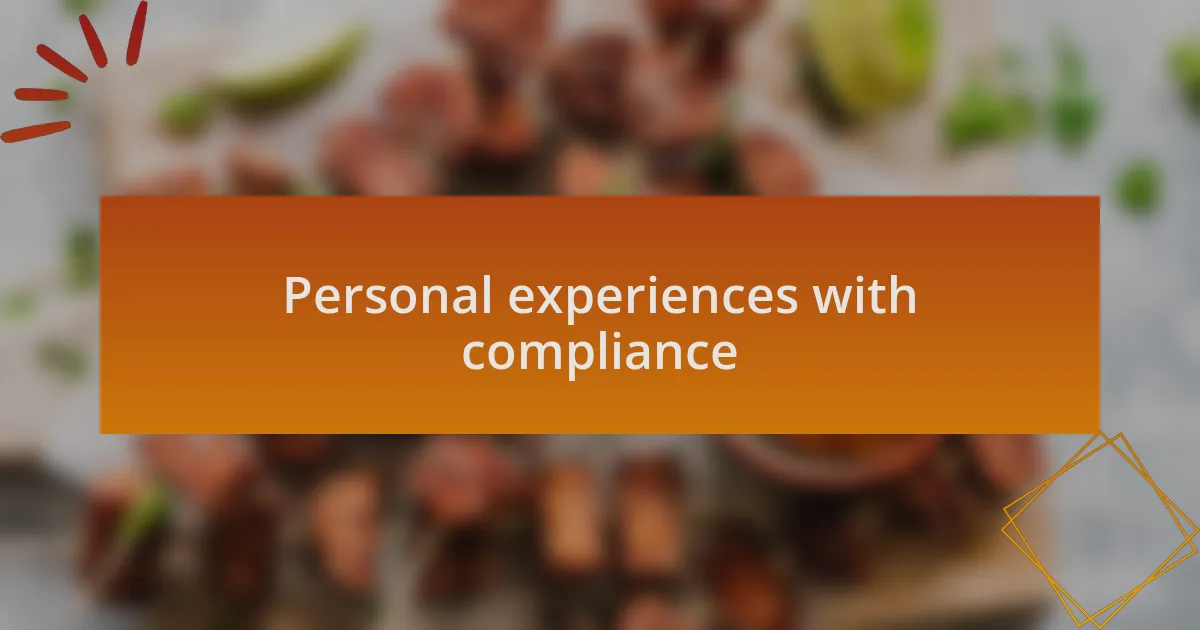
Personal experiences with compliance
Personal experiences with compliance have truly shaped my understanding of the cannabis edibles landscape. I recall a time when I was working with a local edibles company that faced a last-minute inspection right before a big product launch. The stress in the room was palpable; we had to ensure all labeling was compliant with state laws while tiptoeing around federal guidelines. I felt the pressure as everyone sought to align creativity with compliance, and the fear of a setback loomed over us like a storm cloud.
I cannot stress enough how compliance adds complexity to the creative process. At a recent industry networking event, I spoke with a fellow entrepreneur who shared a story about how they had to rebrand their entire line of edibles after a misunderstanding about federal regulations. Imagine pouring your heart—and resources—into a product only to face an unexpected roadblock. It was a lesson in resilience and adaptability, a constant reminder that navigating compliance isn’t just a checkbox; it’s woven into the fabric of our daily operations.
Reflecting on these experiences, I can’t help but question the future of innovation in this space. How many brilliant ideas might be lost because entrepreneurs feel overwhelmed by regulatory hurdles? My conversations with other industry players reveal a shared sentiment: the struggle for compliance often dampens enthusiasm, leaving many of us feeling like we’re two steps forward and one step back. The road to clarity feels daunting, yet it’s an essential journey that could lead to a healthier, more vibrant edibles market.